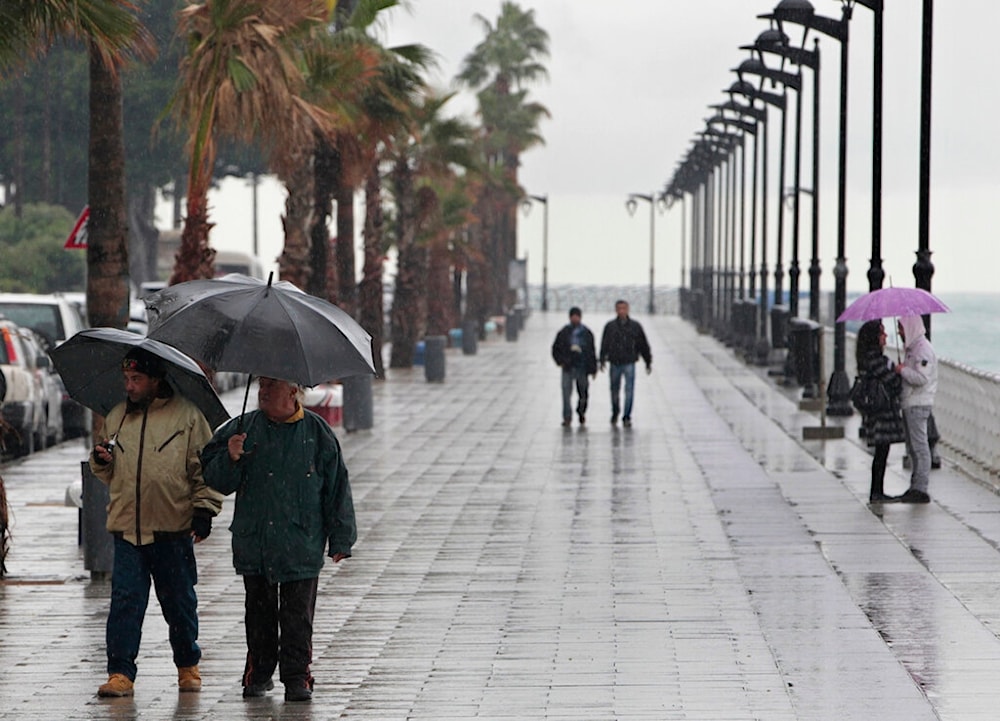Syria denies escalation as Lebanon refutes visit by Syrian FM
Lebanon denies plans for Syrian FM's visit as Damascus dismisses rumors of escalating measures over Syrian detainees in Lebanese prisons.
-

Lebanese citizens with their umbrellas walk in rainy overcast weather on the Corniche, or waterfront promenade, in Beirut, Lebanon, on Tuesday Jan. 17, 2012 (AP Photo/Hussein Malla)
Lebanese Foreign Minister Yousef Raji confirmed on Friday that Beirut has not received any official communication regarding a planned visit by his Syrian counterpart, Asaad al-Shibani.
In a statement to Al Mayadeen, Raji emphasized that “Beirut has not received any Syrian memorandum, neither through the Foreign Ministry nor via the joint committee.”
The denial came in response to circulating media reports suggesting that the Syrian foreign minister was set to arrive in Beirut for diplomatic talks amid rising political concerns.
Damascus dismisses reports of planned escalation
A Syrian government source speaking to Syrian state television rejected claims of any intent by Damascus to adopt escalatory measures toward Lebanon. “There is no truth to what is being circulated about the Syrian government's intention to take escalatory actions against Lebanon,” the source stated.
The Syrian government reaffirmed its focus on resolving the issue of Syrian detainees held in Lebanese prisons, describing it as a top priority. Damascus stressed the need to address the matter through official diplomatic channels between the two countries, highlighting the ongoing efforts to stabilize Syrian-Lebanese relations.
Media reports suggest possible Syrian pressure tactics
Despite official denials, several Syrian media outlets reported that Damascus is allegedly considering gradual pressure measures aimed at pushing Beirut to move forward on the detainee file. These steps could include freezing elements of security and economic cooperation, with some reports even speculating about the possible closure of land border crossings or restrictions on Lebanese truck traffic.
The reports, though unverified, have stirred speculation of a deeper Lebanon-Syria diplomatic crisis emerging over stalled coordination and unresolved bilateral issues.
According to a Lebanese security source, approximately 2,000 Syrian nationals are currently held in Lebanese prisons. Among them are hundreds accused of terrorism-related offenses or affiliation with extremist groups, many of whom have been referred to military courts. Some detainees are also suspected of involvement in attacks against the Lebanese army during the height of the war in Syria.
Syria mending ties with 'Israel'
Israeli-Syrian ties were the topic least debated in public, despite being one of the hot topics discussed behind closed-door meetings between Israeli Prime Minister Benjamin Netanyahu and US President Donald Trump at the White House, Yedioth Ahronoth reported.
Though absent from public discourse, the newspaper describes the topic as one of the most dramatically significant undercurrents in recent diplomacy. According to the report, efforts to normalize ties between Tel Aviv and Damascus could allow Syria’s leadership to claim a major political breakthrough before its citizens.
The paper claims that normalization, however limited, could serve as a springboard for broader regional stability and act as a catalyst for renewed “peace talks” across the Middle East. It speculates that the evolving dynamic might eventually lead to a partial reconfiguration of ties between “Israel” and Syria’s post-conflict regime.
One potential gesture mentioned is the return of the remains of Israeli spy Eli Cohen, executed in Syria in 1965, as part of a series of mutual confidence-building measures.
From diplomacy to investment
The report further notes that such steps could pave the way for an expanded diplomatic process, starting with formalizing bilateral relations, followed by reforms in Syria’s educational system and even Israeli support for agricultural development in border regions.
According to Yedioth Ahronoth, “If peace efforts between Israel and Syria progress and the relationship stabilizes, moderate Sunni states such as Saudi Arabia, Jordan, and the United Arab Emirates would be more inclined to invest in Syria without the looming fear of war.” This, in turn, would significantly reduce the financial risks tied to major investments.
The newspaper also links the potential thaw in “Israel”-Syria relations to broader US ambitions in the region. It argues that Trump’s push to expand the so-called “Abraham Accords” could bolster his status, positioning him as a frontrunner for the Nobel Peace Prize, which is on his checklist.
Such a diplomatic win, the article suggests, would serve as a cornerstone of Trump's agenda to “Make America Great Again,” both by reasserting US influence in the Middle East and positioning the United States as a central player in the reconstruction and development of a post-war Syria.

 4 Min Read
4 Min Read










